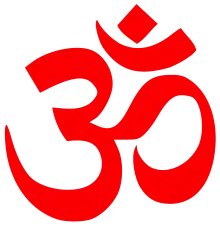Lakshmana
Lakshmana (Sanskrit: लक्ष्मण, IAST: lakṣmaṇa, lit. he who has the signs of fortune), also spelled as Laxman or Lakhan, is the younger brother of the god Rama and his aide in the Hindu epicRamayana. He is also known by other names- Saumitra ( IAST: saumitra, lit. son of Sumitra), Ramanuja ( IAST: rāmānuja, lit. younger brother of Rama) and Bharatanuja ( IAST: bharatānuja, lit. younger brother of Bharata).
| Lakshmana | |
|---|---|
Valiant brother of lord Rama | |
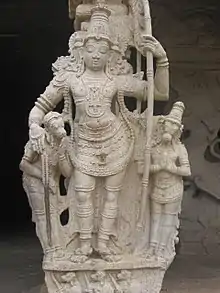 Lakshmana at Srivaikuntanathan Perumal temple | |
| Devanagari | लक्ष्मण |
| Sanskrit transliteration | Lakṣmaṇa |
| Affiliation | Avatar of Shesha |
| Abode | Vaikuntha, Kshira Sagara |
| Weapon | bow and arrows, dagger |
| Personal information | |
| Born | Ayodha |
| Died | Ayodha suryu river |
| Parents | Dasharatha (father) Sumitra (mother) Kaushalya (step-mother) Kaikeyi (step-mother) |
| Siblings | Shatrughna (brother) Rama (step-brother) Bharata (step-brother) Shanta (step-sister) |
| Spouse | Urmila |
| Children | Angada Chandraketu[1] |
| Dynasty | Raghuvamsa, Suryavamsa |
Lakshmana is the twin brother of Shatrughna. According to the Valmiki Ramayana, Lakshmana is one quarter (25%) component of the manifestation of the god Vishnu and is considered to be an avatar of Vishnu, whose full avatar Rama is considered.[2] However some scriptures regard him as the avatar of Shesha, the thousand-headed serpent associated with Vishnu.
Birth and marriage
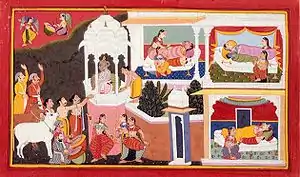
King Dasharatha of Ayodhya had three wives: Kausalya, Kaikeyi and Sumitra. He performed a sacrifice to beget sons and as a result, his queens became pregnant. Lakshmana and his brother Shatrughna were born to Sumitra; while Rama and Bharata were born to Kausalya and Kaikeyi.[3]
In the Puranas, Lakshmana is described as an incarnation of Shesha, the multiple-headed nāga (serpent) upon whom rests the god Vishnu, whose avatar Rama is considered.
When sage Vishwamitra takes Rama for killing the demons in the forest, Lakshmana accompanies them and goes to Mithila with them. Lakshmana is especially attached to Rama. When Rama marries Sita, Lakshmana marries Sita's younger sister Urmila. They had two sons—Angada and Chandraketu.
Later, when Rama is exiled for fourteen years on the insistence of Kaikeyi, Lakshmana leaves his wife Urmila and joins Rama and Sita in exile.[3]
Rama's exile
Lakshmana serves Rama and Sita reverently during the exile. In Panchvati, Lakshmana also builds a hut for Rama and Sita to live in. Lakshmana cuts off Ravana's sister Surpanakha's nose in anger when she tries to seduce Rama and insults Sita. He plays an important role in the war with Ravana and slays Ravana's sons Indrajit, Atikaya.
When Sita asks Rama to fetch a magical golden deer for her, Rama asks Lakshmana to stand guard as he sensed danger and evil. The golden deer is in fact the demon Maricha, who distracts Rama. When Rama kills Maricha, he cries out in Rama's own voice for help. Although Lakshmana knows that Rama is invincible and beyond any danger, Sita panics and frantically orders Lakshmana to go to Rama's aid immediately. Unable to disobey Sita, Lakshmana draws a perimeter line (Lakshmana Rekha or Lakshmana's line), which Sita must not cross and goes in search of Rama. Sita however, out of compulsion of religious duty and compassion for Ravana disguised as a poor brahmin crosses the line to give him alms following which she is abducted. Lakshmana Rekha has become a metaphor in situations where a certain limit must not be transgressed by human beings in any circumstance whatsoever.
During the war between Rama and Ravana, he killed Indrajit and Atikaya, who were the sons of Ravana. Before he killed Indrajit, Lakhshmana and Rama were twice defeated by Indrajit and in both occasions Hanuman's intervention saved them from certain death.[4] After the war, when Rama asked Sita to give a test of her purity, Lakshmana for the first time got angry with Rama and opposed him.
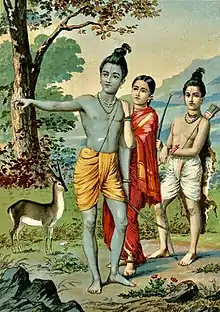 Rama portrayed as a vanvasi (forest dweller) in the forest with his wife Sita and brother Lakshmana
Rama portrayed as a vanvasi (forest dweller) in the forest with his wife Sita and brother Lakshmana Lakshamana cuts Surpanakha's nose
Lakshamana cuts Surpanakha's nose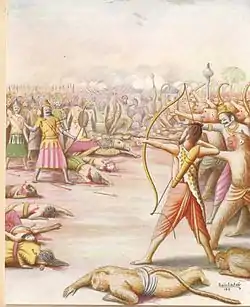 Killing of Indrajit by Lakshmana
Killing of Indrajit by Lakshmana
After exile
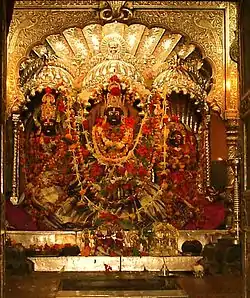
After the war in Lanka, Rama was crowned king of Ayodhya and Bharata became the crown prince. Rama had offered to make Lakshmana the crown prince but he refused, saying Bharata is elder than him and more deserving of the title. Rama hearing this was very pleased and said " O Lakshmana in this birth you served me so well and did your duties as a younger brother I will do the same in next birth as your younger brother". Thus in the next birth, Rama becomes Krishna and Lakshmana becomes Balarama's elder brother to Krishna.
Lakshmana is the one who leaves Sita in the forests near sage Valmiki's ashram after she expressed her desire to leave the kingdom. Lakshmana remains loyal to his brother and fights against Rama's sons Lava and Kusha later.
Abandonment of life
Sage Durvasa appears at Rama's doorstep and seeing Lakshmana guarding the door, demands an audience with Rama. At the time, Rama was having a private conversation with Yama. Before the conversation began, Yama gave Rama strict instructions that their dialogue was to remain confidential, and anyone who entered the room was to be relieved of their life. Rama agreed and entrusted Lakshmana with the duty of guarding his door. When Durvasa made his demand, Lakshmana politely refused. The sage grew angry and threatened to curse all of Ayodhya if Lakshmana did not immediately inform Rama of his arrival. Lakshmana, in a dilemma, decided it would be better that he alone die to save all of Ayodhya from falling under Durvasa's curse and so interrupted Rama's meeting to inform him of the sage's arrival. Durvasa cursed him that he should go to heaven alive. Rama quickly concluded his meeting with Yama and received the sage with due courtesy. In order to fulfil his brother's promise, Lakshmana went to the banks of the river Sarayu resolved on giving up the world by drowning himself in the Sarayu river. From there, Indra revomed Lakshmana from the water and took him alive to heaven [5]
Legacy
Lakshmana is personified by Rama as a man with unwavering loyalty, love and commitment to his elder brother through times of joy and adversity alike.
Bandhavgarh Fort at Madhya Pradesh (bandhav as brother, garh as fort) is said to be given by Rama to his brother Lakshmana to keep a watch on Lanka.[6]
Military officers given the rank equivalent of admirals in navies in the Malay Archipelago including Malaysia and Indonesia are titled "Laksamana" (Jawi script: لقسامان) after the figure.
Descendants
The community members of an imperial dynasty Gurjara-Pratihara claimed that they were called Pratihara as their ancestor Lakshmana served as a door-keeper to his elder brother Rama. They ruled much of Northern India from the mid 7th to the 11th century.
Jain version
Lakshman is referred as Vasudev in Jain Ramayana. According to Jain Ramayana it was Laxmana who killed Ravana, not Rama.[7]
In popular culture
| Year | TV Series | Channel | Country | Played by |
|---|---|---|---|---|
| 1987–1988 | Ramayan (TV series) | DD National | India | Sunil Lahri |
| 1997-2000 | Jai Hanuman (1997 TV series) | DD Metro | India | Manish Khanna |
| 2000 | Vishnu Puran | Zee TV | India | Amit Pachori |
| 2002 | Ramayan (2002 TV series) | Zee TV | India | Bijay Anand |
| 2008–2009 | Ramayan (2008 TV series) | NDTV Imagine | India | Ankit Arora |
| 2011-2014 | Devon Ke Dev...Mahadev | Life OK | India | Kunal Verma |
| 2012–2013 | Ramayan (2012 TV series) | Zee TV | India | Neil Bhatt |
| 2015–2016 | Siya Ke Ram | Star Plus | India | Karan Suchak |
| 2015–2017 | Sankatmochan Mahabali Hanuman | Sony TV | India | Ankur Verma / Arun Mandola |
| 2019–2020 | Ram Siya Ke Luv Kush | Colors TV | India | Navi Bhangu |
Notes
- (sulochana in Ramayana ) Ramayana – Conclusion, translated by Romesh C. Dutt (1899)
- Rao, Desiraju Hanumanta. "Valmiki Ramayana - Baala Kanda - Sarga 16". valmikiramayan.net.
- Mani, Vettam (1975). Puranic Encyclopaedia: A Comprehensive Dictionary With Special Reference to the Epic and Puranic Literature. Delhi: Motilal Banarsidass. pp. 448-9. ISBN 978-0-8426-0822-0.
- B. A van Nooten William (2000). Ramayana. University of California Press. ISBN 978-0-520-22703-3.
- "When Sri Rama gives death penalty to Laxman". News Track. 2 April 2020. Retrieved 17 June 2020.
- Padmanabhan, Geeta (14 February 2018). "Holding fort at Bandhavgarh Wildlife Sanctuary". The Hindu. ISSN 0971-751X. Retrieved 2 July 2020.
- "No exaggerations: The truth behind what happened in the Ramayana". The Indian Express. 10 November 2015. Retrieved 2 July 2020.
External links
 Media related to Lakshmana at Wikimedia Commons
Media related to Lakshmana at Wikimedia Commons
.jpg.webp)
